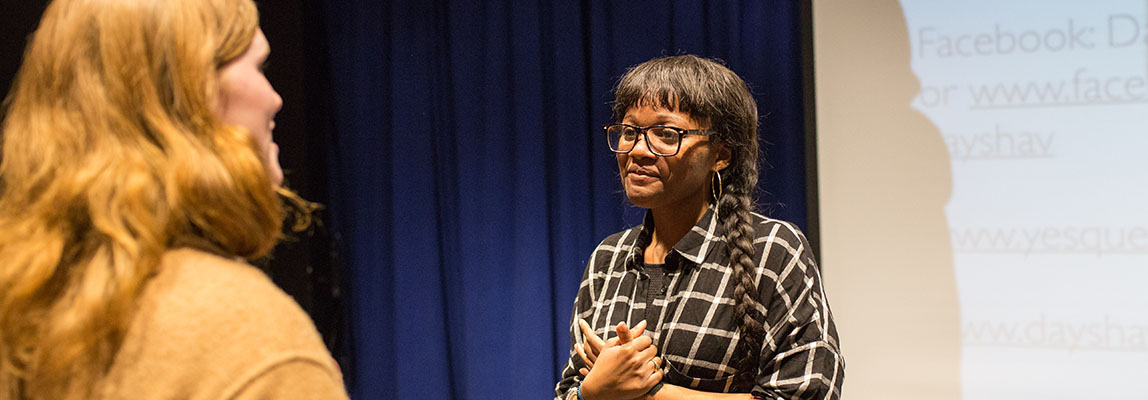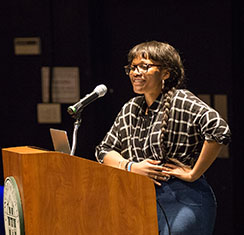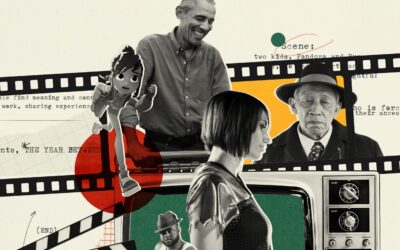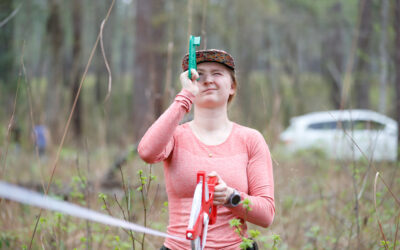
An enthusiastic greeting rang out when Daysha Edewi ’10 took the stage in the Performing Arts Center on March 1. At BuzzFeed, the social media influencer and viral video hitmaker created more than 100 videos involving spoken-word poetry, body positivity, health and wellness, race, and gender, which generated over half a billion views in less than four years. Edewi recently left BuzzFeed to found Yes Queen, a website affirming women’s power.
When she started as a student at CA, Edewi said, she was quiet and reserved and struggling with her identity and body image. She offered some advice to any students in that situation: “This is just the beginning,” she said. “Everyone goes through a rough patch.” By her senior year, Edewi said, she had had her “glow-up,” growing into a confident student head of school.
Just before she graduated, by happenstance she took screenwriting with film teacher Justin Bull, little guessing that her experience in that course would make such a strong impression. “Watching Do The Right Thing by Spike Lee stirred up some very intense feelings,” she said. She hadn’t fully been aware of the power of video to probe deeply before then. At Scripps College, she fell further in love with the impact media can have on people, became a media studies major, and made an experimental documentary, My Schizophrenic Existence: Examining Blackness in Personal and Academic Spaces, for her senior thesis.

The topic of that thesis — the challenge of being a minority in predominantly white spaces — is one she’s still exploring. “It’s a double-edged sword,” she said. “It’s important to your economic well-being and fitness but toxic to your sense of identity and belonging.” For different reasons, minorities are ‘othered’ within both the communities they’ve adapted to and their home communities, because they’ve changed in adapting. “You end up questioning everything you say and do no matter where you are,” she said.
Edewi knows how important television shows and other media are in shaping public perceptions. While the conversation about diversity in media, or the lack of it, usually revolves around casting, Edewi defined the actual problem as exclusionary framing and titling of content and “inaccurate depictions that strip non-whites and the non-privileged of their humanness.”
As an example, she pointed to Lena Dunham’s HBO show Girls. On one side, she displayed an official show poster that depicted the four main characters, all white, with some out-of-focus women of color in the background under the word “girls.” However, because she felt that the show misused the inclusive term “girls” in the title, and presented a main cast that excluded girls who are non-white — an omission that drew much criticism for being particularly noticeable in the show’s multicultural setting of New York City — Edewi displayed a modified poster titled “White Girls” as a way to call out how the show is actually perceived from a person of color’s perspective. “If you’re going to use inclusive titles,” she said, “make sure you’re being fully representative, because as Sojourner Truth, a black, early-day feminist, has profoundly stated, ‘Aren’t I a woman?’”
Similarly, she points to the differences in the ways that the TV shows Living Single, about six black 20-somethings and their relationships, and Friends, about six white 20-somethings and their relationships, were packaged and sold — the first for “the culture,” she said, the other, “for America.”
During her time at BuzzFeed, Edewi occasionally practiced what video creators there called “inclusion without commentary”: representing minorities without calling attention to their identities in titles. The backlash was usually swift and fierce. On a video called People Get Transformed Into Their Heros, which featured an all-black cast without mentioning that fact, for example, many viewers left outraged comments.
Edewi acknowledged that some careful lines must be walked to avoid diluting the nuanced experience of minorities or getting trapped in all-good or all-bad dichotomies when portraying minority characters, rather than “the complex in-between” that most people experience. But Edewi considers it more harmful, as she said, to use “inclusive words that aren’t reflecting inclusivity in content and casting.”
She encouraged the CA community to join her in demanding more due diligence in calling out white-dominated spaces as racialized. She left her audience with some questions to consider:
Why do viewers experience such a strong sense of deception when content featuring minorities isn’t labeled as such?
Why are all-white casts not generally regarded as racial statements?
And what can we do as consumers to change the media landscape?
Following her assembly, Edewi met with several student groups on campus — during a showing of her videos on Thursday evening’s Dinner Docs, on Friday at the Women of Color (WoCA) meeting, and on Saturday at CA’s Alum and Student of Color Retreat.


